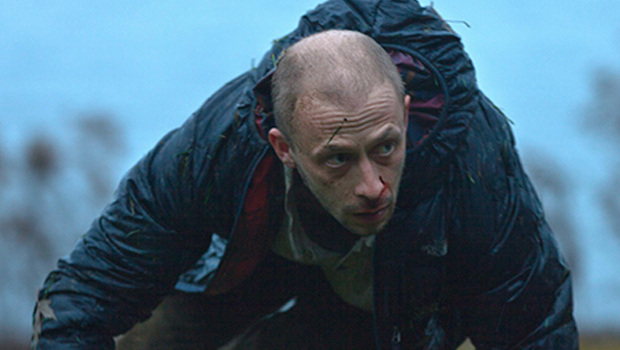The Biz Interview: Actor-Writer Maxwell McCabe-Lokos of The Husband
Maxwell McCabe-Lokos is the actor and co-writer of Bruce McDonald’s new film, The Husband, which opens today in Vancouver at The Cinematheque. We spoke with Maxwell to find out more about the film and his acting and writing career.
Can you briefly walk us through your creative process for the writing this film and also acting in it?
The writing began several years ago working with my co-writer, Kelly Harms. We would meet a couple times a week for a few hours, pretty light duty, until we had a first draft. It actually took a long time because we were both concentrating on other things the whole time. Eventually Kelly decided he didn’t want to work on the project anymore and I took the script to Bruce McDonald (director), Dan Bekerman and Cher Hawrysh (producers). Once they were involved I did many rewrites in a pretty short amount of time, addressing their notes and concerns as well as those of our eventual financier. At first the creative process was purely creative, just riffing with Kelly and making scenes up. We drew from books, news events and movies we liked and thought were a good match. Later on, working on my own and with Dan, Bruce and Cher, it was more about editing. Refining the ideas from three years ago and making picking the ones that are relevant. I don’t have any specific creative process for acting. Just think about it, decide how the character is and try to live with that for as long as possible before shooting. Know your lines. It was actually kind of difficult for me to concentrate on the acting sometimes because I was so involved with the production. I was going to casting sessions and location scouts a couple days before shooting began. Once we started shooting I tried to remember that I had to be Henry Andreas and not to worry about whether or not we got the right colour rental car for what we were going to shoot the next day.
What themes and ideas do you want the audience to think about
from watching the film?
I would like them to think about forgiveness, culpability, and the powerlessness you have to change irrevocable events. The movie is a character portrayal of a man unable to find a solution for his problem and unable to find a satisfying person to blame and therefore to punish. He takes on some of this blame in order to move on and continue with his life.
What was the most challenging part of the writing process?
Waiting around for months and months while people and production companies and financiers who initially showed interest deliberated behind closed doors. Writing is fun. Editing is fun. Waiting to eventually hear “we don’t think people will relate to Henry, he’s not ‘likeable’” is frustrating.
What was the most challenging part of the acting process?
In this particular case, as I mentioned above, the difficulty was being part of the crew and part of the cast. I wish I had had more time to concentrate on some of the scenes before shooting them, and that I was less distracted on set. Everybody did their best to facilitate this but I felt compelled to be involved in everything since I had been the motor behind the project since day one. In other projects I do not write I find it very difficult to deliver a joke I do not think is funny. It is like unwrapping a [crappy] present in front of the person who got it for you and pretending you like it.
From your perspective, what are the keys to creating effective drama in a script?
Make things feel authentic. Jettison cliché and corny tropes. Do your research when research needs to be done and make sure you are not writing simulacrum. Don’t be too careful about offending people. Let the character lead the story.
Who are your major inspirations for writing?
I like a lot of writer-directors such as Noah Baumbach, The Dardenne Brothers, Michael Haneke, Woody Allen, Leos Carax, Nicole Holofcener, Andrea Arnold, Mike Leigh, John Cassavetes, Charlie Kaufman, P.T. Anderson, Armando Iannucci… too many to name. Fiction I am inspired by is work by Denis Johnson (Tree of Smoke), Jonathan Littell (The Kindly Ones), Ben Marcus (The Flame Alphabet and short fiction), William Faulkner, Carson Mell, Bruce Chatwin, Hemingway, Georges Bataille. I am not sure these were all influential in writing of The Husband but they are people I draw daily inspiration from.
What about acting?
I like Sam Rockwell, John Hawkes, Ben Mendelsohn, Isabelle Huppert, Philippe Noiret, Gérard Depardieu (circa 1981), Jean Louis Trintignant, James Gandolfini, Sally Hawkins.
Are there any authors or specific books that have been influential in your creative development?
See above. Plus Sigmund Freud and The New Yorker.
What is the biggest obstacle facing writers and actors today?
Attempting to blandly satisfy what they think is expected of them. Making dreck. Copying bullshit they see on insipid TV and movies. Bad taste!
What advice would you offer to actors who also want to write?
Try to be original while thinking of your audience. Don’t write something exclusively for you to watch or perform because you like it. If you’re going to copy something, copy something good.
Are there any upcoming projects that you’re working on that you’d like to mention?
I am working on another feature called Pushing Rope about a lousy stand-up comedian and the woman he loves. I have written the script and I am now looking for the right producer to take it to the next step. I intend to direct it but have considered finding an fitting director as an option. I have a couple short films in the works and have started writing another feature, yet untitled. I am always auditioning and acting in other productions, shooting a movie this summer.
The Husband is now playing at The Cinematheque.

















